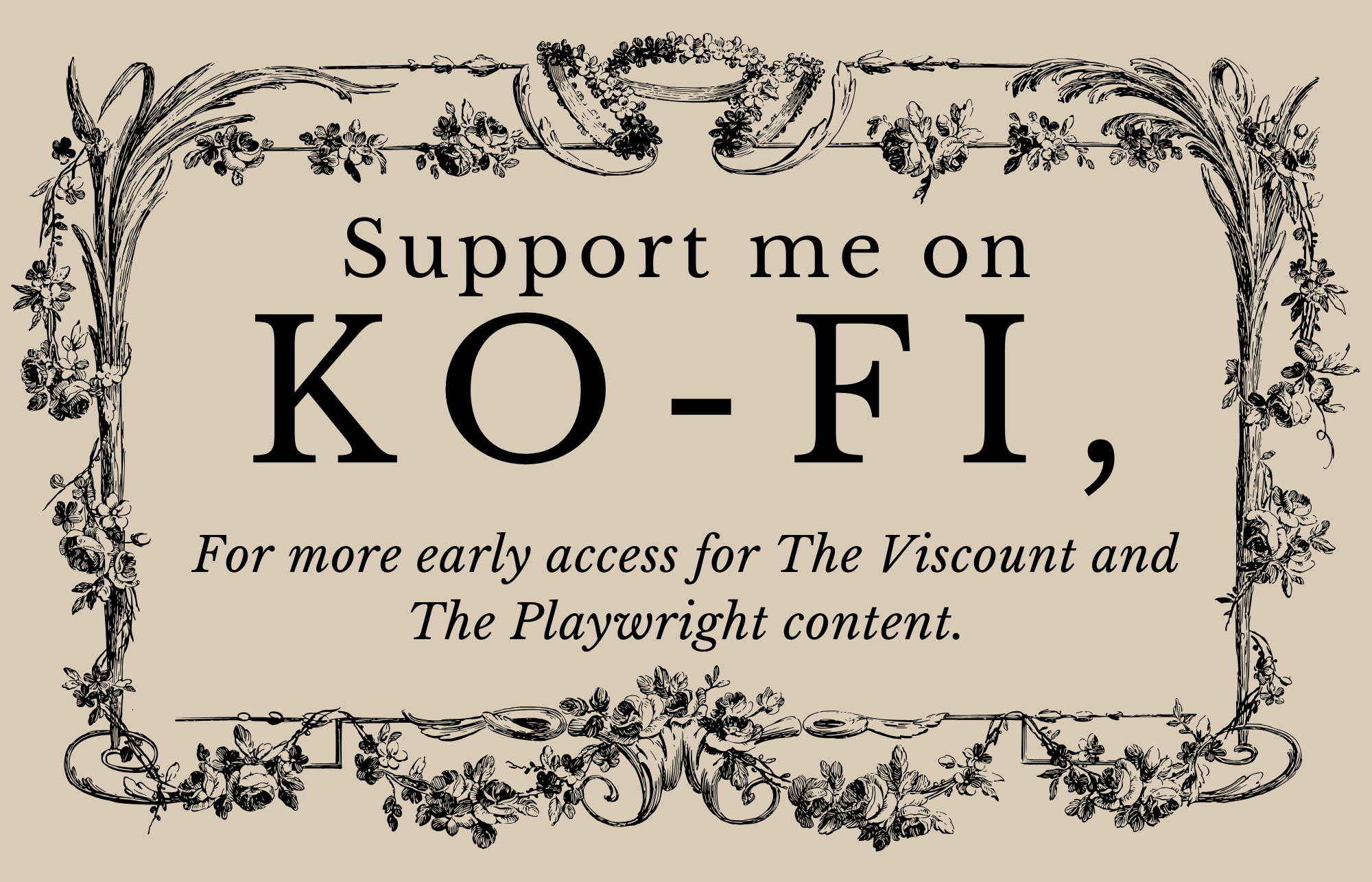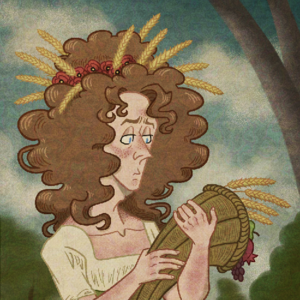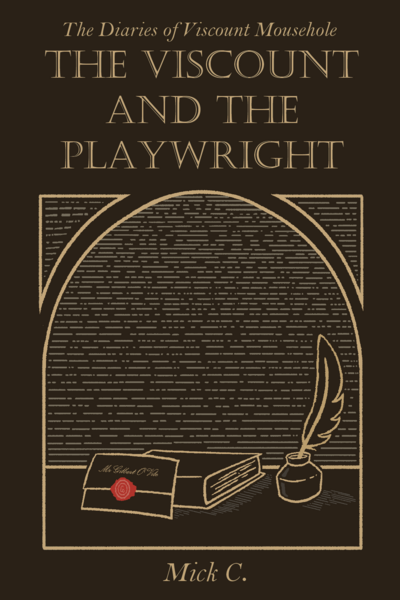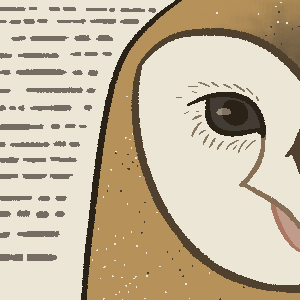Saturday, 06 July—Leaving Edgemont
I left Edgemont with my mother with our stagecoach for Penworth yesterday after I stayed thither for a fortnight. Elinor and her father gave me such greatest farewell before I left their manor after an early breakfast. My journey from Edgemont to Penworth with a stagecoach took long for its terrain; yet not much shorter than I could expect since I arrived early in Penworth in the morning for breakfast. My pusses cried and begged upon my presence. I could remember my dearest felicities upon my blue Bowie and a spotted magpie Peggy, whom my dearest Mother named her after an actress she met in Bath six years before it passed through recently.
My only brother Alexander does not seem to be pleased upon my presence as I could expect onto his cold, dreadful politeness as I could expect for a fussy younger brother of mine being annoyed by his older brother.
Tuesday, 11 July—Farewell from Penworth
It was fortnight ago, after I met Mr Gilbert O’Vile, he gave me the letter as an invitation for dinner at twilight as he never accepts guests other than me! I shall not tell dear Mother as I only told Uncle Charles and my valet Mr Montgomery to keep the invitation private from Mother; yet I began to fret for my dear Mother for discovering that her son going to Bloodham Hall without her, an estate located near Stratsberry and owned by Mr Gilbert O’Vile, as she never wanted her eldest son to be lost or seen as deceased. I lied to Mother as I told her that I would be staying with Daniel. For Alexander, his mere impoliteness did not greet me for a great farewell, yet a good riddance, before I left Penworth.
Friday, 14 July—A Private Dinner
I arrived in Bloodham for a half-and-three days with Mr Montgomery and Mr Matthews, our coachman. I met Mr Gilbert O’Vile again as he appeared to be well-mannered unlike our first encounter. We passed to the ante room as he guided me to the library, located beside the dining room. The color of the walls and the floor of the room contrast with the white ceiling. The wall was filled with engraved patterns; and displayed portraits of important and respected figures, and landscapes of Bloodham.
He asked me if I was eligible as Elinor’s husband as I may not be sure with an offer; but a courtship and betrothal must require approval from our parents since we have not reached one-and-twenty yet. I was led to the dining room after some similar civil whiskers. When our dinner was finished, a short young fair skinned maidservant named Miss Pamela Collins guided me to the room where I shall be staying within his commands. It was the room where his poor wife died after birthing a healthy son. It was dark, dreadful, old, and empty since it had never been restored, opposed to the bedroom next to mine whither was filled with bright, colorful patterns, appeared to be more recent. The entrance to the room was located near the stairs of the grand hall as I heard Mr Gilbert O’Vile ordering Mr Matthews and Mr Montgomery to leave Bloodham as they went back to Penworth.
Saturday, 15 July—Touring Bloodham
Mr Gilbert O’Vile guided me to tour the rooms of Bloodham; yet he forbade me to stay in his bedroom unless for important matters as he led me to the morning room. He left thither as he started writing a play; and ordered poor Miss Pamela Collins for this task. Miss Collins guided me to the drawing room, located next to the grand hall. The drawing room was filled with tapestries that her master reminded of his tour in Rome. We went to the library, again, as we passed to the dark ante room. I followed Miss Collins to the library as she was searching upon the books from the shelves that have quite smaller amount than Penworth. The books were written by Mr John Kemble and Shakespeare; yet others were novels that were written by Ms Frances Burney and other Gothic books. I shifted my focus to the portraits of late Lady Amelia O’Vile and her late husband, Sir Edward O’Vile, Baronet.
Bloodham Hall was an ancestral house of the Irish O’Vile family, built during the reign of Elizabeth of England. They were Irish Protestants; yet the exceptions are Sir Seamus, his daughters, his brother Gilbert, who converted during his stay in Venice; and Lady O’Vile, Elinor’s Venetian mother, since they are Catholics.
Miss Collins and I went upstairs to tour the gallery. The stairs to the gallery were located near her master’s bedroom. No one had ever been to the gallery except for her master, his own wife, his servants, and sometimes guests. I quite adored the view of the gardens. It felt that Mr Gilbert O’Vile and his relatives were fairly flushed in the pockets, perhaps quite wealthy for a renowned commoner dramatist, judging by a certain fair exotic bird that mimics the words of a man.
A young maidservant of Miss Collins’s age named Miss Sarah O’Connor approached Pamela as their master waited for my presence since breakfast was ready. We rushed as we headed to the grand hall as it was a shortcut to the dining room. Their master was not pleased upon my arrival as he raised his blame with a stern voice at poor Miss Collins that reminds me of my strict late grandfather Robert.
A view from outside, a pale spotted golden owl approached the courtyard. It was calm and gentle till it screeched like a banshee, warning the presence of a white lady, the pale ghost haunting Bloodham, whom I saw before my slumber. She was dressed mostly in white as her dark curled hair flowed along the wind, addressing unfortunate omens of the large manor before she disappeared as she strolled away from my sight. Upon my curiosity, I finished breakfast as I searched further for other ghosts, no whither to be seen but heard somewhither else.
Mr Gilbert O’Vile caught me with strange suspicion as he followed me to the library for civil whiskers that perhaps involved church owls; yet he never mentioned a white lady that resembled his own wife as she never appeared within his side. The mere presence of the ghost leaned closer to Gilbert as he began to shiver; he warned me to leave to the drawing room before I escaped with Miss Collins to my bedroom for a better change of clothing; yet a short bitter banter with her whilst I hurried along before we strolled for a better look of his beloved garden.
Monday, 17 July—Camilla the Cockatoo
Before breakfast, Misses Collins and O’Connor checked the gallery to see Camilla, a fair white cockatoo with pale yellow streaks of feathers behind her. The cockatoo mimicked sounds from the gallery; yet I mayn't be sure if she mimicked strange sounds from a poor ghost. She was a gift from the Marquise de Guerre for Ms Margaret Lennox as she named her after the titular character from a novel, written by Mrs Frances Burney, Mme D’Arblay. The master of this estate does not come hither quite often since his beloved cockatoo would annoy him or his guests since there was a situation involving her screeching noises that mimicked church owls that warned his wife's final birth. It led him to leave the cockatoo to the gallery unless he commissioned a portrait of himself. I went up thither again as Miss Collins acted as my chaperone; she told me that Ms Lennox was fond of keeping birds, especially a church owl she named Cecilia, after her own Italian god aunt or a character from one of Ms Frances Burney’s novels.
An engraving of Gilbert O'Vile and his cockatoo, by Sir Lawrence Campbell, 1807
Thursday, 20 July—Letter from Mother
PENWORTH HOUSE—16 July
My dearest son Colin,
I shall give you my greatest farewells before you leave Penworth alone since you are too young to be alone as a young lad. A journey to the Northside has never been safe without your fellow valet like the experienced Mr Montgomery, and our very own coachman like Mr Matthews. It is better if you were guided with your Uncle Charles or I, your very own dear mother, as your guardian. It was queer to know you never told your dear mother if you stayed somewhither on the Northside. Perhaps, I could bet that you decided to stay with Mr Benjamin Hawkins and his grandfather, the Marquis of Stratsberry. I was just hoping that you are not staying in a manor where this poor miserable Mr Gilbert O’Vile lives.
From Your Dearest Mother, The Countess of St Ives
I never read letters from my dearest mother after I settled in Bloodham Hall. Her letters were delivered hither for few days; yet I was uncertain upon Mr Gilbert O’Vile’s opinion about her till he approached the anteroom, threatening to burn her letters to the fireplace as I could witness, his haughty commands forbade me to send letters to my own mother. He is willing to read letters before I could receive them if these letters insulted the poor dramatist. He threatened to burn them into ashes if they did as he despised my own mother; yet he never burned a single letter from Mother for the fear of the pale white lady as I could sense her wrath towards him.
Tuesday, 25 July—Away from Penworth
A week has passed as I began to fret for my poor Mother’s sanity. I had been wondering if she started to worry as I ought to return to Trinity till coming of age for the grand tour. Mr Gilbert O’Vile had been reading letters in the drawing room or in the library. He was reading my diary to suspect entries which disobeyed his commands. He insulted Mother as he ordered me not to yearn for Mother’s return as he called her a mad hysteric. He never wants any commands to be disobeyed as he wrote a dramatic play for a handsome courtesan he met as he was infatuated with their beauty.
I never wondered why he was infatuated with a courtesan, mayhaps, someone who was an easy virtue for him. His behaviour led me to question if his dearest wife Peggy yearned to be returned with her dear sister before their marriage, mayhaps to be rumoured to be eloped in Venice since their marriage has never been recognised until she turned the age of one-and-twenty.
Margaret Lennox as Proserpine, by Sir Lawrence Campbell, 1793












Comments (0)
See all